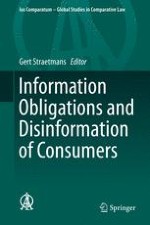2019 | OriginalPaper | Buchkapitel
Information Obligations and Disinformation of Consumers: English Law Report
verfasst von : John Cartwright
Erschienen in: Information Obligations and Disinformation of Consumers
Verlag: Springer International Publishing
Aktivieren Sie unsere intelligente Suche, um passende Fachinhalte oder Patente zu finden.
Wählen Sie Textabschnitte aus um mit Künstlicher Intelligenz passenden Patente zu finden. powered by
Markieren Sie Textabschnitte, um KI-gestützt weitere passende Inhalte zu finden. powered by
